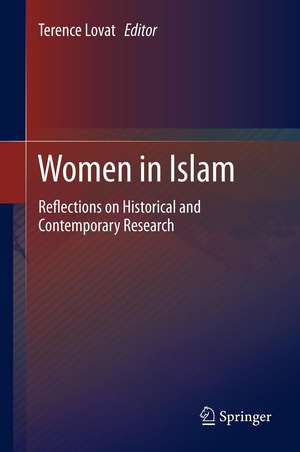Women in Islam: Reflections on Historical and Contemporary Research
Editat de Terence Lovaten Limba Engleză Paperback – 18 iul 2014
The material comes from around the world as well as from Muslim and non-Muslim researchers. It takes in work from majority Muslim nations such as Bangladesh, Iran, Iraq, Lebanon, Pakistan, Palestine, Tunisia and Turkey, as well as countries with troubled interfaith relations such as India and Israel. Nations with minority Muslim populations such as France, the UK, Canada and Australia, are also represented. The work also features varying Islamic sub-groups such as the two main ones, Sunni and Shi’a, as well as less well known populations such as the Ismaili Muslims. In each case, the work is underpinned by the very latest socio-theological insights and empirical data.
| Toate formatele și edițiile | Preț | Express |
|---|---|---|
| Paperback (1) | 638.57 lei 43-57 zile | |
| SPRINGER NETHERLANDS – 18 iul 2014 | 638.57 lei 43-57 zile | |
| Hardback (1) | 644.82 lei 43-57 zile | |
| SPRINGER NETHERLANDS – 13 iun 2012 | 644.82 lei 43-57 zile |
Preț: 638.57 lei
Preț vechi: 751.25 lei
-15% Nou
Puncte Express: 958
Preț estimativ în valută:
122.20€ • 126.81$ • 102.14£
122.20€ • 126.81$ • 102.14£
Carte tipărită la comandă
Livrare economică 17-31 martie
Preluare comenzi: 021 569.72.76
Specificații
ISBN-13: 9789401782654
ISBN-10: 9401782652
Pagini: 260
Ilustrații: XII, 248 p.
Dimensiuni: 155 x 235 x 14 mm
Greutate: 0.37 kg
Ediția:2012
Editura: SPRINGER NETHERLANDS
Colecția Springer
Locul publicării:Dordrecht, Netherlands
ISBN-10: 9401782652
Pagini: 260
Ilustrații: XII, 248 p.
Dimensiuni: 155 x 235 x 14 mm
Greutate: 0.37 kg
Ediția:2012
Editura: SPRINGER NETHERLANDS
Colecția Springer
Locul publicării:Dordrecht, Netherlands
Public țintă
ResearchCuprins
CHAPTER 1: The ‘Women’s Movement’ in Modern Islam: Reflections on the Revival of Islam’s Oldest Issue,Terence Lovat.- CHAPTER 2: Reconciling Traditional Islamic Methods with Liberal Feminism: Reflections from Tunisia by Mohamed Talbi, Kelly al-Dakkak .- CHAPTER 3: Young Muslim Women and the Islamic Family: Reflections on Conflicting Ideals in Bangladeshi Interfaith settings, Santi Rozario & Geoffrey Samuel.- CHAPTER 4: Women and Human Development in the Muslim World: Reflections on Islamic and UNDP Approaches, Muhammad Ahsan .- CHAPTER 5: Being Muslim in the Neoliberal West: Reflections on an Ethnographic Study of Muslim Women in Australia,Belinda Green.- CHAPTER 6: Youth Identity Formation in the Presence of the ‘Other’: Reflections on being Young and Muslim in an Interfaith Setting, Mehmet Ozalp & Kulsoom Siddiqui.- CHAPTER 7: Social Inclusion in the Context of Foreign Policy Debates: Reflections on Jihad, Human Rights and Gender Equality in Islam, Halim Rane.- CHAPTER 8: The Contribution of Muslim Women in the Flourishing of Modern Society: Reflections on Refugee Transition from East to West, Ibtihal Samarayi.- CHAPTER 9: Islamic Legal Maxims for Attainment of Maqasid-al-Shari’ah in Criminal Law: Reflections on the Implications for Muslim Women in the Tension between Shari’ah and Western Law, Luqman Zakariyah.-
CHAPTER 10: The Way Forward for Muslim Women: Reflections on Australia’s Social Inclusion Agenda,Mohamad Abdalla.- CHAPTER 11: Muslim Women in Higher Education: Reflections on Literacy and Modernization in Israel, Zehavit Gross.- CHAPTER 12: Hagar/Hajar, Muslim Women and Islam: Reflections on the Historical and Theological Ramifications of the Story of Ishmael’s Mother, Robert Crotty.- CHAPTER 13: Muslim Women Academics in Higher Education: Reflections from South Africa, Doria Daniels & Nazreen Dasoo.- CHAPTER 14: Muslim Women, Peer Relationships and Educational Trajectories: Reflections on Muslim Stereotypes in a British Setting, Jody Mellor.- CHAPTER 15: Voices from Shia Imami Ismaili Nizari Muslim Women: Reflections from Canada on Past and Present Gendered Roles in Islam, Adil Mamodaly & Alim Fakirani.
CHAPTER 10: The Way Forward for Muslim Women: Reflections on Australia’s Social Inclusion Agenda,Mohamad Abdalla.- CHAPTER 11: Muslim Women in Higher Education: Reflections on Literacy and Modernization in Israel, Zehavit Gross.- CHAPTER 12: Hagar/Hajar, Muslim Women and Islam: Reflections on the Historical and Theological Ramifications of the Story of Ishmael’s Mother, Robert Crotty.- CHAPTER 13: Muslim Women Academics in Higher Education: Reflections from South Africa, Doria Daniels & Nazreen Dasoo.- CHAPTER 14: Muslim Women, Peer Relationships and Educational Trajectories: Reflections on Muslim Stereotypes in a British Setting, Jody Mellor.- CHAPTER 15: Voices from Shia Imami Ismaili Nizari Muslim Women: Reflections from Canada on Past and Present Gendered Roles in Islam, Adil Mamodaly & Alim Fakirani.
Notă biografică
Dr Terence Lovat is Emeritus Professor at The University of Newcastle, Australia. He has been chief investigator of a number of Australian Government funded projects concerned with aspects of Islam and has written extensively in the area. In 2004, he was presented with an award by the Sydney-based Muslim association, Affinity Intercultural Dialogue, for academic work that promoted understanding of Islam.
Textul de pe ultima copertă
The role of women in Islamic societies, not to mention in the religion itself, is a defining issue. It is also one that remains resistant to universal dogma, with a wide range of responses to women’s social roles across the Islamic world. Reflecting this heterogeneity, the editor of this volume has assembled the latest research on the issue, which combines contemporary with historical data.
The material comes from around the world as well as from Muslim and non-Muslim researchers. It takes in work from majority Muslim nations such as Bangladesh, Iran, Iraq, Lebanon, Pakistan, Palestine, Tunisia and Turkey, as well as countries with troubled interfaith relations such as India and Israel. Nations with minority Muslim populations such as France, the UK, Canada and Australia, are also represented. The work also features varying Islamic sub-groups such as the two main ones, Sunni and Shi’a, as well as less well known populations such as the Ismaili Muslims. In each case, the work is underpinned by the very latest socio-theological insights and empirical data.
The material comes from around the world as well as from Muslim and non-Muslim researchers. It takes in work from majority Muslim nations such as Bangladesh, Iran, Iraq, Lebanon, Pakistan, Palestine, Tunisia and Turkey, as well as countries with troubled interfaith relations such as India and Israel. Nations with minority Muslim populations such as France, the UK, Canada and Australia, are also represented. The work also features varying Islamic sub-groups such as the two main ones, Sunni and Shi’a, as well as less well known populations such as the Ismaili Muslims. In each case, the work is underpinned by the very latest socio-theological insights and empirical data.
Caracteristici
Wide spectrum of authorship covers a host of Muslim and non-Muslim perspectives Features research and analysis from many countries, with differing social characteristics relating to Islam Blends long-standing Muslim scholarship with new and innovative PhD research












